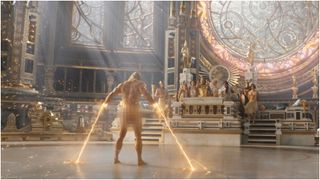You said D&D has never been grimdark, and that the point of heroes is to be hope. I pointed out that heroes have not always been what D&D was about, and it seemed pretty clear to me you were insinuating otherwise. If that's not the case, I apologize.
Firstly, yes D&D has never been Grimdark in its art or tone. The World of D&D is never a crapsack place full of no hope or goodness. Even the darkest settings like Ravenloft and Dark Sun have a narrative of making things better, even if you can never truly win. Greyhawk, for all the perceived shades of Gray that setting is supposed to have, still is a world where good and evil clash. It's just good isn't squeaky clean and evil isn't always wrong. Eberron likewise has a gray morality and it's the farthest from Grimdark you can find.
And I specifically am referring to the tone of the adventures and supplements, not what happened at yours or anyone else's table. Yes you could play an all Evil party in an amoral world of war and survival, but for the majority of the game's life (arguably since Dragonlance and perhaps sooner) the idea the PCs are supposed to be heroes was part of the writing tone. (Evil PCs were often not allowed, evil PC options were removed from the PHB, settings had mechanics to force PCs to behave like Dark Powers checks in Ravenloft or modules written with the assumption of non-evil PCs).
Ironically, the closest I think D&D got to Grimdark was... 4th edition. The whole points of light setting, no "good" aligned monsters, etc. even then, it was very tame. But even in 4e, the assumption was your PC was a hero trying to make things better was inherent to the design.
I'm willing to concede the very earliest D&D had a far darker edge than anything that came later in the 80s and beyond, and if all your D&D art assumptions came from Brom. Dark Sun covers and Elmore girls this stuff might seem a little tame. But as always when we have these discussions, having a counterexample does not negate the generality of saying that D&D has been light and heroic in tone for more of its history than not.





